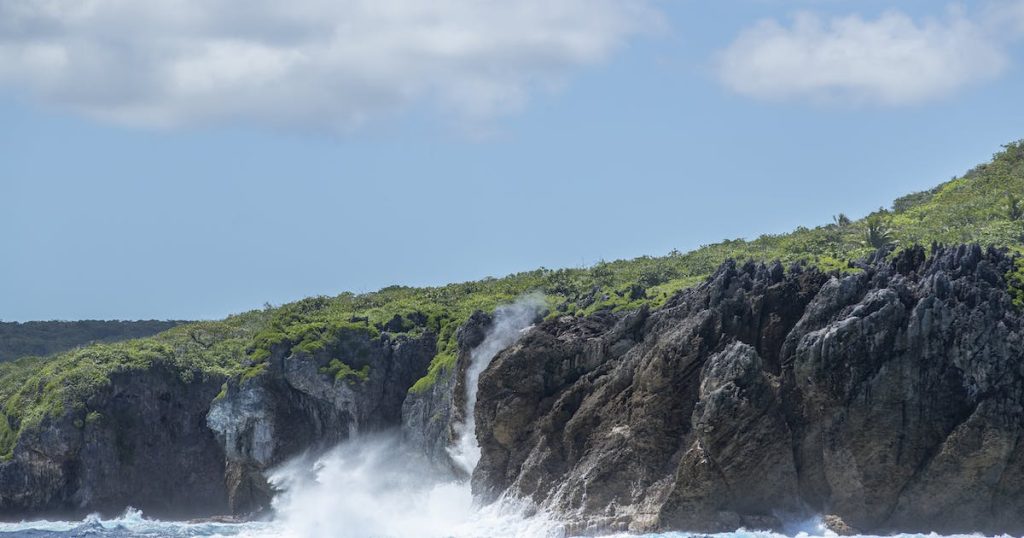‘Small rock’ making big ocean conservation impact
3 min read
In recent years, the small South Pacific island nation of Niue has made ambitious commitments to protect its ocean. But as with many conservation efforts, commitments are only the first step. Implementing durable change invites new challenges entirely.
That’s why Maël Imirizaldu, a regional lead for the Blue Nature Alliance — a global coalition co-founded by Conservation International — approached the government of Niue with a simple question.
“What’s the next critical step in your journey, and can we join you?” Imirizaldu recalled asking.
That question set in motion a quest for funding, which culminated last week with the launch of Niue’s Ocean Conservation Commitments, a new financial mechanism that enables contributors to sponsor a square kilometer of Niue’s ocean waters. With a payment of NZ$ 250 (US$ 148), anyone can help protect Niue’s ocean — a sanctuary for humpback whales, sea snakes and gray reef sharks, among others — for 20 years.
“The same way people would sponsor an elephant, a turtle or a whale, now you can sponsor a piece of ocean,” Imirizaldu said.
Spurred by a public-private partnership between the government of Niue and local non-profit, Tofia Niue, the government has committed to sponsor one credit for each of Niue’s 1,700 citizens — many of whom made their own pledges. And several organizations, including Conservation International and the Blue Nature Alliance, have already committed to sponsor more than 15,000 square kilometers (nearly 6,000 square miles) of ocean.
“Niue isn’t just a mosaic of ancient corals and a vibrant island community — we are a leader. It’s no coincidence that Niue is once again at the forefront of finding creative ways to protect our oceans,” said Coral Pasisi, president of Tofia Niue. “We are often called the ‘small rock of Polynesia’ — but being small means you have to be creative about building big important things that will last. It is time the world properly valued what ocean conservation contributes to the stability of the planet, and fairly contributes to its success.”
Imirizaldu and his team have been working with the government of Niue since 2021 to help develop this financing strategy. He said the ocean conservation commitments are a pragmatic response from local leaders who were stretched thin, trying to wrangle philanthropic funding to support long-term marine protections. They needed more consistent, durable finance.
“This is a bold idea,” Imirizaldu said. “When you talk about supporting the conservation of an entire nation’s ocean, hundreds of thousands of square kilometers, you don’t think about every single kilometer, right?”
That is, until now.
Proceeds from the ocean conservation commitments will be managed by Niue & Ocean Wide Trust, which was also established through the Blue Nature Alliance’s partnership with Niue. With a capitalization target of NZ$ 32 million (US$ 18 million), the Trust will fund conservation activities, compliance and enforcement efforts, community engagement and more.
The hope is for Niue to pave the way for other Pacific Island nations to introduce similar efforts.
“We think this is a prototype for, potentially, a bigger movement around unitizing and monetizing biodiversity conservation efforts globally,” Chris Stone, Conservation International’s vice president of long-term finance, said to McKinsey.
Not every country will be able to replicate Niue’s model, of course. Niue’s topography is unique, with marine territory that is 1,200 times larger than its land mass. But in the wake of the world’s commitment to protect 30 percent of land and sea by 2030 — a goal known as ‘30×30’ — even those who can’t replicate the Ocean Conservation Commitments can imitate their spirit.
“This announcement out of Niue brings us one step closer to a new era of large-scale ocean protection,” said M. Sanjayan, CEO of Conservation International. “The introduction of an Ocean Conservation Commitment is yet more evidence that our 30×30 ambitions are entirely attainable when we unite governments and private funders around creative financing mechanisms.”
Further reading: Protecting the ocean benefits people and nature
Max Marcovitch is a staff writer at Conservation International. Want to read more stories like this? Sign up for email updates here. And, donate to Conservation International here.





